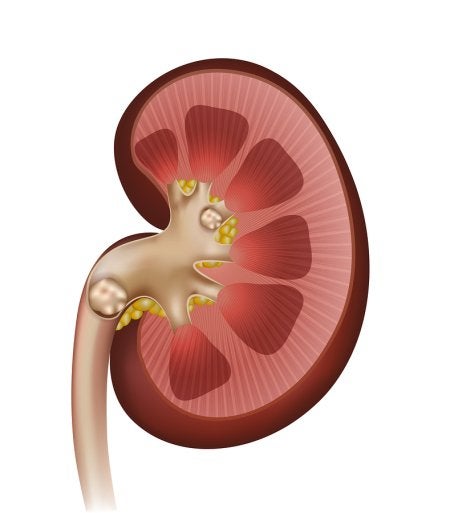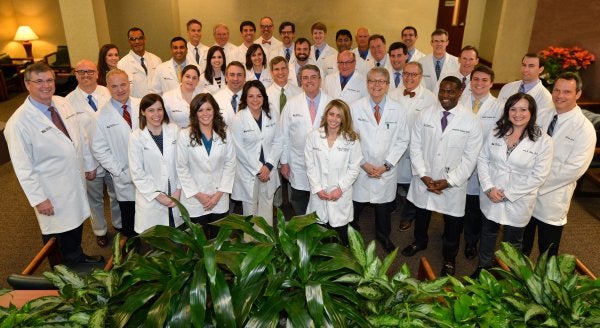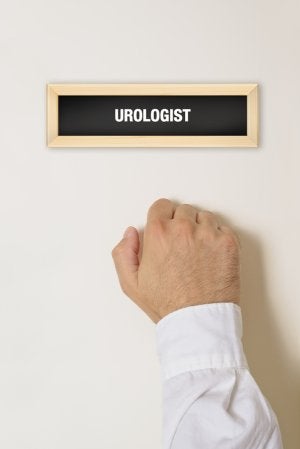-
A Closer Look at Kidney Stone Disease
Kidney stone disease is a common problem treated by urologists in Tennessee, affecting about one in eight people. However, treating kidney stones is much more difficult than preventing kidney stones in the first place. This video from Urology Associates P.C. discusses the disease, as well as providing tips for preventing kidney stones.
If you believe you are suffering from kidney stones, contact the experts at Urology Associates P.C. We are Nashville’s leading urological care provider, with more than 75 years of experience and more than 30 urologists who treat patients at our various locations throughout Tennessee. Contact us online or call us at (888) 329-7700 to schedule a kidney stone screening with one of our experienced urologists. We also invite you to check out our website to learn more about the conditions we treat and the specialty services we provide, including the only free-standing urology surgery center in Middle Tennessee .
-
Symptoms, Causes, and Treatment of Kidney Stones
If you’ve ever had kidney stones , then you know how painful they can be. These hard mineral clumps can cause extreme discomfort as they pass through your urinary system, and can cause urine to back up if they get stuck in a ureter or in your bladder. The good news is that your urologist can help you manage the pain associated with kidney stones and even help you prevent them in future. Continue reading to learn about recognizing the signs of kidney stones as well as understanding the causes and treatment options for them.

Symptoms
If the kidney stones are very small, they may not cause any symptoms at all. Urologists refer to these as silent stones. Larger stones, however, cause a range of symptoms. Pain is the most common. It usually comes on suddenly and may appear as cramping in the side, abdomen, groin, or lower back. It comes in waves but does not improve with rest and is usually quite severe. Nausea, vomiting, fever, and difficulty urinating may accompany the pain.
Causes
Kidney stones form when an excess of the minerals that form stones appears in the urine or when urine volume declines. A number of different factors can cause this to occur, including dehydration from inadequate fluid intake and urinary tract infections (UTI). Many medical conditions can increase the risk of kidney stones, including gout and diabetes. Some medications, such as diuretics, and dietary factors, such as a high-protein diet, can also contribute to kidney stone formation.
Treatment
Depending on the size of your kidney stone, it may pass on its own, and you may only need pain medications to ease your symptoms. If your stone is too large to pass without treatment, your urologist may prescribe medications or use a procedure called lithotripsy, during which shock waves are used to break up the stone. Surgery to remove the stone is also possible.
At Urology Associates P.C. , our doctors can help you get relief from the intense pain of kidney stones in Nashville, and help you develop strategies for preventing future bouts. If you’re experiencing the symptoms of a kidney stone, call us at (888) 329-7700.
-
Questions to Ask Your Urologist About Kidney Stones
Kidney stones are among the most common reasons for a visit to the urologist . These small deposits form inside the kidneys and may not cause symptoms for a while. However, when they begin to move around inside the kidneys or into the ureter, patients typically suffer from very intense pain and other troublesome symptoms. If you’ve been diagnosed with kidney stones, be a proactive patient by learning as much as you can about your condition. Your best source of information is your urologist.
 Will Medications Help?
Will Medications Help? If the stone is small enough to pass on its own, your urologist can prescribe pain relievers to improve your comfort level while you wait. If you only have mild pain, you might take ibuprofen or naproxen. Sometimes, an alpha blocker may be prescribed to relax the muscles in the ureter. This may reduce pain as the kidney stone passes.
Do I Need to Change My Diet?
While you’re waiting for the kidney stone to pass, it’s important to drink plenty of water. As a general rule of thumb, drink enough water so that your urine is clear. Even after you pass the kidney stone, it’s a good idea to continue drinking plenty of water to reduce your risk of future kidney stones. Additionally, some people may benefit from dietary changes . Ask your doctor if you should reduce your intake of salt, sugar, and animal protein, or increase your intake of fruits and vegetables.
Should I Have Surgery to Remove the Stone?
Many people can pass kidney stones without the need for surgery. However, some kidney stones are too large to pass. These will need to be removed surgically. Additionally, surgical intervention may be required if the kidney stones cause complications such as kidney damage, bleeding, or persistent urinary tract infections.
At Urology Associates, P.C. , we pride ourselves on our abiding commitment to superior patient education. If you’re suffering from kidney stones in Nashville, you can find the solutions you’re looking for at our facility. Should you require urology surgery for kidney stones, you can take advantage of the sophisticated medical technology in our Urology Surgery Center.
-
Spotlight on the Urology Surgery Center (USC)

At Urology Associates, P.C., we pride ourselves on offering our patients the very latest in medical technology and techniques to improve outcomes and patient safety. In addition to our on-site diagnostic and imaging center, urology patients can rely on our state-of-the-art Urology Surgery Center—the only freestanding surgical facility in Middle Tennessee that specializes in urologic conditions. At our Urology Surgery Center, USC, you can undergo a procedure within a comfortable setting and return home the same day. Kidney stones, prostate cancer, and bladder cancer are just a few of the conditions our specialists can treat.
The Urology Surgery Center is licensed by Tennessee as an ambulatory surgical facility, accredited by AAAHC, and certified by Medicare. To serve the needs of our patients, our facility features three operating rooms, two fluoroscopy urology rooms, four procedure rooms, and a 17-bay recovery room, along with a spacious and comfortable waiting area for family and friends.
If you’re anticipating a procedure at the Urology Surgery Center of Urology Associates, P.C., please view our informative patient brochure . Should you have any questions about urology in Nashville, one of our friendly staff members will be happy to assist you.
-
Who Is Urology Associates?

If your physician has referred you to a urologist, you can rely on the team at Urology Associates, P.C. to provide personalized, compassionate care. Our 12 locations throughout the Nashville area and our 10 satellite clinics means that our urology patients are never very far away from getting the help they need. We are widely recognized as the leading provider of treatments for issues related to urology in Nashville and beyond.
At Urology Associates, P.C., you’ll have access to our on-site diagnostic and imaging center, which features the latest in medical technology to inform accurate diagnoses and effective treatment recommendations. At our on-site Urology Surgery Center, patients can undergo non-invasive treatments and minimally invasive surgeries. We are also pleased to offer our patients a suite of specialty services at our Advanced Therapeutics Center, Women’s Institute for Sexual Health, and our new Men’s Health Clinic.
There’s no need to suffer with kidney stones, sexual dysfunction, incontinence, or related health problems. Contact Urology Associates, P.C. today and let us know how our team can help you.
-
What Conditions Are Treated at The Women’s Institute for Sexual Health?
Urology Associates, P.C. is a urology clinic dedicated to going above and beyond to meet the needs of our patients. In addition to providing urologic care for conditions such as kidney stones, our urology team provides care for women’s sexual health at The Women’s Institute for Sexual Health (WISH). At WISH, our urologists can diagnose and treat a wide array of medical conditions.

Interstitial Cystitis
Also called painful bladder syndrome , this chronic condition involves bladder pain and pressure, which can cause mild to severe discomfort. Normally, the bladder sends impulses along the pelvic nerves to tell the brain when it’s time to void the bladder. A woman with interstitial cystitis has “confused” signals, which cause her to feel the need to urinate more often, though the amounts may be inconsequential.
Pelvic Organ Prolapse
A woman’s pelvic organs are normally supported by muscles and ligaments. When these supporting structures become weak, these organs can prolapse, or become displaced. Pelvic organ prolapse can occur after childbirth, menopause, or a hysterectomy. Often, urologists recommend surgical procedures to correct this problem.
Urinary Incontinence
Urinary incontinence is a condition that affects many women. This condition is broadly defined as the unintentional loss of urine. There are different types of incontinence, such as stress incontinence. This occurs when urine leaks out unintentionally when the individual coughs, sneezes, or engages in other activities that place stress on the bladder. In many cases, lifestyle modifications can help. Treatment for incontinence may also include bladder training, double voiding, and scheduled toileting, along with pelvic floor muscle exercises. If these treatments are ineffective, a urologist may recommend medications, medical devices such as a pessary, or surgery.
These are just a few of the conditions our urologists can treat at The Women’s Institute for Sexual Health at Urology Associates, P.C. To better support women’s sexual health in Nashville, our team members strive toward providing extensive patient education and sensitive, specialized care. You can call (888) 329-7700 to reach a friendly staff member or explore our website to learn more about us.
-
What Is a Urologist?
 Some doctors are primary care physicians, while others are specialists. A urologist is a specialist who diagnoses and treats diseases and disorders of the urinary tract in both male and female patients. Urologists also treat medical conditions of the male reproductive organs. Urology is a surgical specialty. However, a urologist receives in-depth training across a broad range of areas, including internal medicine and gynecology. There are also subspecialties within the field of urology, including pediatric urology, male infertility, female urology, and urologic oncology (Prostate Cancer, Bladder Cancer and Testicular Cancer).
Some doctors are primary care physicians, while others are specialists. A urologist is a specialist who diagnoses and treats diseases and disorders of the urinary tract in both male and female patients. Urologists also treat medical conditions of the male reproductive organs. Urology is a surgical specialty. However, a urologist receives in-depth training across a broad range of areas, including internal medicine and gynecology. There are also subspecialties within the field of urology, including pediatric urology, male infertility, female urology, and urologic oncology (Prostate Cancer, Bladder Cancer and Testicular Cancer). This last subspecialty deals with cancers of the urinary tract such as bladder cancer, in addition to reproductive cancers such as testicular cancer.
Urologists evaluate and treat the many structures that make up the urinary tract and reproductive system. These include the kidneys, the prostate, adrenal glands, ureters, urethra, bladder, and seminal vesicles. Urologists address conditions such as bladder prolapse, urinary incontinence, enlarged prostate, and prostatitis. They also perform surgeries to remove kidney stones, a common problem of the urinary tract. In addition to surgical procedures, urologists can treat conditions with medical management.
If you’re looking for a urologist in Nashville , call Urology Associates, P.C. at (888) 329-7700. Our urology practice treats a broad range of conditions, including kidney stones, urinary incontinence, and certain cancers.
Recent Posts
categories
- Uncategorized
- Bladder Cancer
- Women's Sexual Health
- MonaLisa Touch
- Urology
- Urologist
- Erectile Dysfunction
- Kidney Cancer
- Incontinence
- Prostate
- MonaLisa Touch Laser Treatment
- Kidney Stones
- Urinary Tract Infections
- Event
- Sexual Dysfunction
- Testicular Cancer
- Prostate Cancer
- Urology Surgery Center
- urinary incontinence
- vaginismus
- noncoital pain disorder
- Hypoactive Sexual Desire Disorder
- Infographic
- provenge
- Xofigo
- robotic surgery
- hormone replacement
- diabetes
- renal cell carcinoma
- pelvic pain
- hematuria
- sexual health
- chronic testicular pain
- premature ejaculation
- Men's Health Clinic
- Dr. Melvin Seard
- Interstitial Cystitis
- vasectomy
- overactive bladder
- vaginal atrophy
- nocturia
- bladder infections
- urethral strictures
- Acute Epididymitis
- low sex drive
- circumcision
- pelvic floor dysfunction
- Peyronie's Disease
- prostatitis
- female sexual dysfunction
- varicocele
- difficult urination
- low libido
- PSA levels
- male fertility
- penile prosthesis
- prostatic intraepithelial neoplasia
- male infertility
- estrogen levels
- nurse navigator
- stress urinary incontinence
- vaginal yeast infection
- elevated psa
- painful sex
- adult circumcision
- epididymitis
- OAB
- kidney infection
- penile cancer
- pelvic organ prolapse
- Vasectomy Reversal
- bone health
- cystectomies
- clinical trials
- bloody urine
- Advanced Therapeutic Center
- WISH MedSpa
- neurogenic bladder
- WISH Team
- prostate biopsies
- BPH
- fecal incontinence
- lithotripsy
- osteoporosis
- kidney cysts
